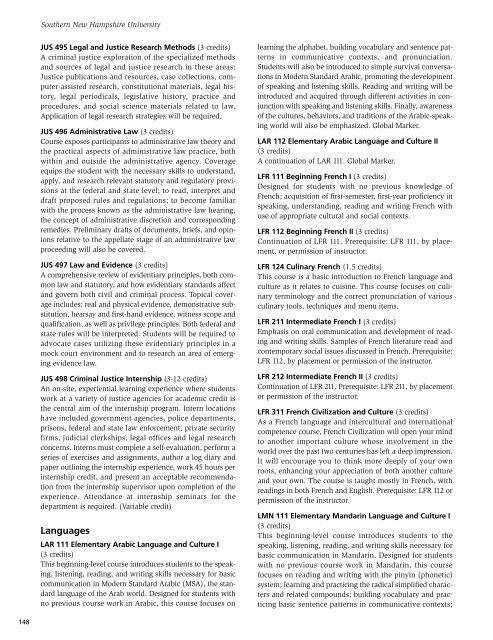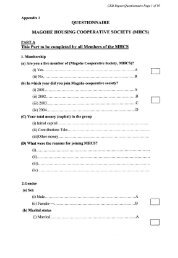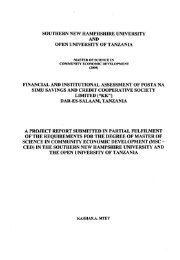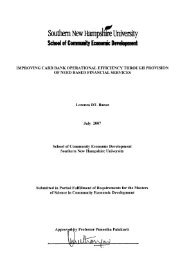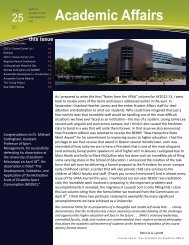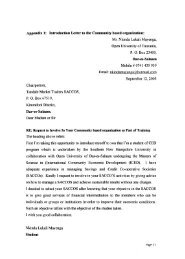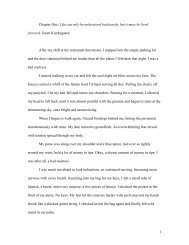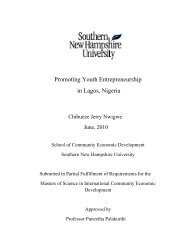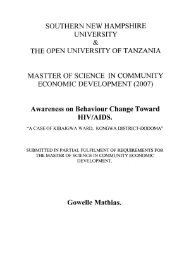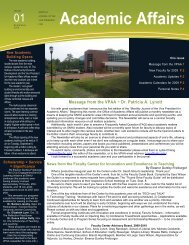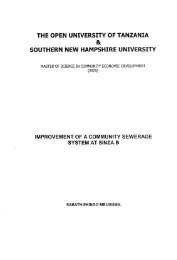Undergraduate Catalog 2010-2011 - SNHU Academic Archive ...
Undergraduate Catalog 2010-2011 - SNHU Academic Archive ...
Undergraduate Catalog 2010-2011 - SNHU Academic Archive ...
Create successful ePaper yourself
Turn your PDF publications into a flip-book with our unique Google optimized e-Paper software.
Southern New Hampshire University<br />
JUS 495 Legal and Justice Research Methods (3 credits)<br />
A criminal justice exploration of the specialized methods<br />
and sources of legal and justice research in these areas:<br />
Justice publications and resources, case collections, computer-assisted<br />
research, constitutional materials, legal history,<br />
legal periodicals, legislative history, practice and<br />
procedures, and social science materials related to law.<br />
Application of legal research strategies will be required.<br />
JUS 496 Administrative Law (3 credits)<br />
Course exposes participants to administrative law theory and<br />
the practical aspects of administrative law practice, both<br />
within and outside the administrative agency. Coverage<br />
equips the student with the necessary skills to understand,<br />
apply, and research relevant statutory and regulatory provisions<br />
at the federal and state level; to read, interpret and<br />
draft proposed rules and regulations; to become familiar<br />
with the process known as the administrative law hearing,<br />
the concept of administrative discretion and corresponding<br />
remedies. Preliminary drafts of documents, briefs, and opinions<br />
relative to the appellate stage of an administrative law<br />
proceeding will also be covered.<br />
JUS 497 Law and Evidence (3 credits)<br />
A comprehensive review of evidentiary principles, both common<br />
law and statutory, and how evidentiary standards affect<br />
and govern both civil and criminal process. Topical coverage<br />
includes: real and physical evidence, demonstrative substitution,<br />
hearsay and first-hand evidence, witness scope and<br />
qualification, as well as privilege principles. Both federal and<br />
state rules will be interpreted. Students will be required to<br />
advocate cases utilizing these evidentiary principles in a<br />
mock court environment and to research an area of emerging<br />
evidence law.<br />
JUS 498 Criminal Justice Internship (3-12 credits)<br />
An on-site, experiential learning experience where students<br />
work at a variety of justice agencies for academic credit is<br />
the central aim of the internship program. Intern locations<br />
have included government agencies, police departments,<br />
prisons, federal and state law enforcement, private security<br />
firms, judicial clerkships, legal offices and legal research<br />
concerns. Interns must complete a self-evaluation, perform a<br />
series of exercises and assignments, author a log diary and<br />
paper outlining the internship experience, work 45 hours per<br />
internship credit, and present an acceptable recommendation<br />
from the internship supervisor upon completion of the<br />
experience. Attendance at internship seminars for the<br />
department is required. (Variable credit)<br />
Languages<br />
LAR 111 Elementary Arabic Language and Culture I<br />
(3 credits)<br />
This beginning-level course introduces students to the speaking,<br />
listening, reading, and writing skills necessary for basic<br />
communication in Modern Standard Arabic (MSA), the standard<br />
language of the Arab world. Designed for students with<br />
no previous course work in Arabic, this course focuses on<br />
learning the alphabet, building vocabulary and sentence patterns<br />
in communicative contexts, and pronunciation.<br />
Students will also be introduced to simple survival conversations<br />
in Modern Standard Arabic, promoting the development<br />
of speaking and listening skills. Reading and writing will be<br />
introduced and acquired through different activities in conjunction<br />
with speaking and listening skills. Finally, awareness<br />
of the cultures, behaviors, and traditions of the Arabic-speaking<br />
world will also be emphasized. Global Marker.<br />
LAR 112 Elementary Arabic Language and Culture II<br />
(3 credits)<br />
A continuation of LAR 111. Global Marker.<br />
LFR 111 Beginning French I (3 credits)<br />
Designed for students with no previous knowledge of<br />
French; acquisition of first-semester, first-year proficiency in<br />
speaking, understanding, reading and writing French with<br />
use of appropriate cultural and social contexts.<br />
LFR 112 Beginning French II (3 credits)<br />
Continuation of LFR 111. Prerequisite: LFR 111, by placement,<br />
or permission of instructor.<br />
LFR 124 Culinary French (1.5 credits)<br />
This course is a basic introduction to French language and<br />
culture as it relates to cuisine. This course focuses on culinary<br />
terminology and the correct pronunciation of various<br />
culinary tools, techniques and menu items.<br />
LFR 211 Intermediate French I (3 credits)<br />
Emphasis on oral communication and development of reading<br />
and writing skills. Samples of French literature read and<br />
contemporary social issues discussed in French. Prerequisite:<br />
LFR 112, by placement or permission of the instructor.<br />
LFR 212 Intermediate French II (3 credits)<br />
Continuation of LFR 211. Prerequisite: LFR 211, by placement<br />
or permission of the instructor.<br />
LFR 311 French Civilization and Culture (3 credits)<br />
As a French language and intercultural and international<br />
competence course, French Civilization will open your mind<br />
to another important culture whose involvement in the<br />
world over the past two centuries has left a deep impression.<br />
It will encourage you to think more deeply of your own<br />
roots, enhancing your appreciation of both another culture<br />
and your own. The course is taught mostly in French, with<br />
readings in both French and English. Prerequisite: LFR 112 or<br />
permission of the instructor.<br />
LMN 111 Elementary Mandarin Language and Culture I<br />
(3 credits)<br />
This beginning-level course introduces students to the<br />
speaking, listening, reading, and writing skills necessary for<br />
basic communication in Mandarin. Designed for students<br />
with no previous course work in Mandarin, this course<br />
focuses on reading and writing with the pinyin (phonetic)<br />
system; learning and practicing the radical simplified characters<br />
and related compounds; building vocabulary and practicing<br />
basic sentence patterns in communicative contexts;<br />
148


